Friedlingstein P, O’Sullivan M, Jones MW, et al.. "Global Carbon Budget 2024". Earth System Science Data. November 13, 2024. https://essd.copernicus.org/... (Contributed by Gregory Autin).
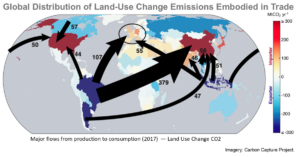 The latest Global Carbon Budget 2024 report, published in the journal Earth System Science Data, shows that global CO2 emissions from fossil fuels will reach a record level in 2024. Caused by fossil fuels from combustion engines of all kinds and agriculture, the global carbon budget increased by 0.8 percent compared to last year. This is only partially offset by the absorption of greenhouse gases by natural carbon sinks such as oceans and forests. The higher the temperatures, the less the natural carbon sinks can absorb, which is particularly evident in the case of forests where reforestation is far from sufficient to compensate for deforestation. There is nothing to suggest that the global carbon cycle peak caused by anthropogenic activities has already been reached.
The latest Global Carbon Budget 2024 report, published in the journal Earth System Science Data, shows that global CO2 emissions from fossil fuels will reach a record level in 2024. Caused by fossil fuels from combustion engines of all kinds and agriculture, the global carbon budget increased by 0.8 percent compared to last year. This is only partially offset by the absorption of greenhouse gases by natural carbon sinks such as oceans and forests. The higher the temperatures, the less the natural carbon sinks can absorb, which is particularly evident in the case of forests where reforestation is far from sufficient to compensate for deforestation. There is nothing to suggest that the global carbon cycle peak caused by anthropogenic activities has already been reached.
Posted on 13/11/24
Recent Abstracts

True (but Requires Context): Finland Faces the Highest Costs under EU’s Environmental Restoration Law Relative to its Economy
The European Nature Restoration Law (NRL) establishes rules and procedures for the restoration and conservation of natural resources and ecosystems to compensate or offset damage to natural resources and promote sustainable development. While center-right, far-right and conservative politicians such as Kai Mykkänen, F ...
Posted on 18/06/24
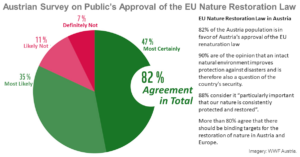
Nature Restoration: Austrian Conservatives Charge Gewessler for Abuse of Office
The Austrian Environment Minister Leonore Gewessler (Greens) voted in defiance of the coalition partner to pass the EU’s Nature Restoration Law, thereby pushing it through by a narrow majority. She decided that it was her duty to approve this central pillar of the EU’s efforts to reverse the major degradation of its l ...
Posted on 17/06/24

The Anthropocene Reality of Financial Risk
Financial services are critical for corporate activities to regenerate and promote biosphere resilience as a key strategy to confront the new risk landscape and are essential to the transformation needed for a sustainable future. Current financial risk frameworks focus mainly on financial materiality and risks to the f ...
Posted on 16/06/24
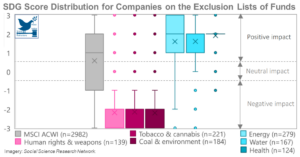
ESG to SDG: Do Sustainable Investing Ratings Align with the Sustainability Preferences of Investors, Regulators, and Scientists?
ESG and SDG cannot be used interchangeably to identify the sustainability of companies and their contribution to social development and the planet, although they are complementary. Where sustainable investors aim to invest in companies that contribute to sustainable development, there is disagreement on how best to me ...
Posted on 14/06/24

Perceptions of Stakeholders on Nature-Based Solutions in Urban Planning: A Thematic Analysis in Six European Cities
Numerous social and ecological benefits are associated with nature-based solutions (NBS). This study gathered the views of stakeholders engaged in urban planning regarding the importance of nature-based solutions (NBS). The findings revealed that stakeholders perceive numerous social and ecological advantages associa ...
Posted on 13/06/24
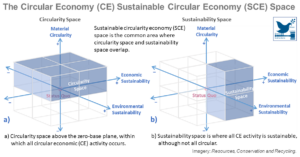
Why ‘Circular’ Doesn’t Always Mean ‘Sustainable’
Material circularity (MC) develops positively when a material is circulated through reuse, refurbishment, remanufacture, or recycling at its highest quality, it usually being measured through material flow analysis (MFA). When economic value is generated as commonly measured through life cycle costing (LCC), economic ...
Posted on 12/06/24
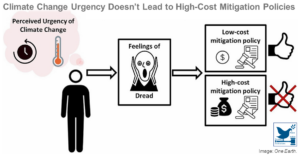
Fighting Climate Change: Cheaper than ‘Business as Usual’ and Better for the Economy
The often-repeated and seldom-challenged view that climate change solutions are expensive and uneconomical has long thwarted public support for even the most common-sense measures. While economics research documents far greater costs of climate change damages, those opposing actions to confront climate change point to ...
Posted on 11/06/24

Build Resilient Infrastructure, Promote Inclusive and Sustainable Industrialization and Foster Innovation
SDG 9 of the UN Sustainable Development Goals (SDGs) sets out eight targets and twelve indicators used to monitor the achievement of the goals. With more than half of the world's population living in cities, mass transport, renewable energy and carbon reduction call for solutions and new industries and information and ...
Posted on 07/06/24
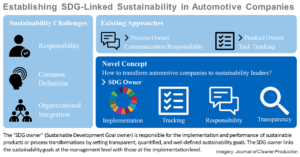
On Influencing Factors for Sustainable Development Goal Prioritisation in the Automotive Industry
Sustainability has become a key corporate strategy inspiring companies to implement the UN Sustainable Development Goals (SDGs). This paper identifies the SDG priorities in the automotive industry worldwide, from the point of view of the geographic, cultural, social, and economic specifics of the countries in which th ...
Posted on 06/06/24
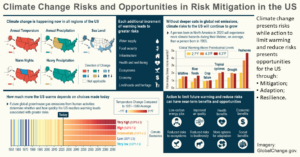
Fifth National Climate Assessment: Understanding Risks, Impacts, and Responses
Adaptation planning more effectively reduces climate risk when it identifies not only disparities in how people are affected by climate change but also the underlying causes of climate vulnerability. Transformative adaptation involves consideration of the physical and social drivers of vulnerability and how they inter ...
Posted on 05/06/24

Major Economic and Financial Risks Posed by Climate Change
Failure to transition will generate significant and widespread economic and financial risks. An economic forecast from Swiss Re, one of the world's largest reinsurers, projects a loss in global gross domestic product (GDP) of between 4.2 and 18.1 percentage points by mid-century, depending on different warming scenario ...
Posted on 04/06/24

Net zero city: The Timeline of Increasing Urgency
During the past decade, more renewable power was added to the grid annually than fossil fuel and nuclear power combined. Renewable technologies dominate the global energy market for new electricity generation capacity simply because they have become the cheapest sources of electricity in many markets. 260 gigawatts of ...
Posted on 03/06/24

For critical minerals, it’s better to talk about SDGs than ESG
Economic strategies aim to drive research and innovation, develop bilateral and multilateral partnerships further economic reconciliation with indigenous peoples. Among the most recognizable values credentials companies use to demonstrate their commitment to best practices are environmental, social, and governance (ESG ...
Posted on 31/05/24

Nature Positive: Guidelines for the Transition in Cities
A crucial shift is required in urban development away from solely preventing climate change towards environmental action that protects and restores nature. Cities can advance their nature-positive transition and expedite restorative and renaturalization actions to benefit and reap the rewards of a sustainable and resi ...
Posted on 30/05/24
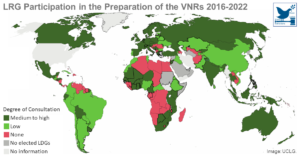
Towards the Localization of the SDGs
To accelerate SDG localization and sustainable local and regional development, national governments must urgently implement an enabling framework for subnational governments to meet their devolved responsibilities and the demands of the communities. The Sustainable Development Goals (SDGs) are a holistic agenda intend ...
Posted on 29/05/24

